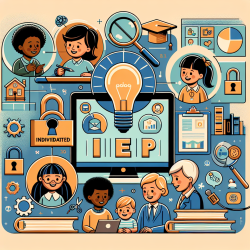Unleashing the Power of Deep Learning in Speech-Language Pathology
In the rapidly evolving landscape of healthcare, deep learning is a revolutionary tool that is transforming various fields, including speech-language pathology. The research article, "Opportunities and obstacles for deep learning in biology and medicine," provides insights into how deep learning can be applied to improve outcomes in speech-language pathology, especially in pediatric therapy. This blog explores these insights and encourages practitioners to harness the power of deep learning to enhance their skills and improve therapeutic outcomes for children.
Understanding Deep Learning
Deep learning, a subset of machine learning, involves algorithms that can automatically learn and improve from experience without being explicitly programmed. It is particularly effective in processing large amounts of complex data, making it a valuable tool in data-rich fields like speech-language pathology. The ability of deep learning to identify patterns and make predictions can significantly enhance the diagnostic and therapeutic processes.
Opportunities in Speech-Language Pathology
The application of deep learning in speech-language pathology presents numerous opportunities:
- Improved Diagnosis: Deep learning algorithms can analyze speech patterns and detect anomalies more accurately than traditional methods, leading to early diagnosis and intervention.
- Personalized Therapy: By analyzing data from various sources, deep learning can help tailor therapy plans to the individual needs of each child, enhancing the effectiveness of interventions.
- Progress Tracking: Continuous monitoring and analysis of a child's progress can be automated, allowing therapists to adjust treatment plans dynamically.
Challenges and Considerations
While the potential of deep learning is immense, there are challenges that practitioners must consider:
- Data Privacy: Handling sensitive patient data requires strict adherence to privacy regulations to protect patient confidentiality.
- Data Quality: The effectiveness of deep learning models depends on the quality of data. Ensuring accurate and comprehensive data collection is crucial.
- Interpretability: Understanding how deep learning models arrive at their conclusions is essential for gaining trust and ensuring ethical use.
Encouraging Further Research
Practitioners are encouraged to delve deeper into the research on deep learning and explore its applications in speech-language pathology. By staying informed about the latest advancements, therapists can adopt innovative approaches to improve therapeutic outcomes. Collaborative research efforts can also lead to the development of new tools and techniques that further enhance the field.
To read the original research paper, please follow this link: Opportunities and obstacles for deep learning in biology and medicine.










